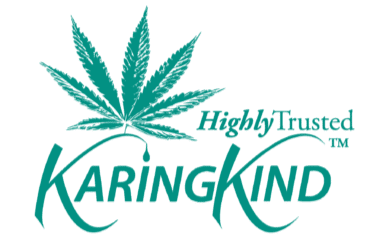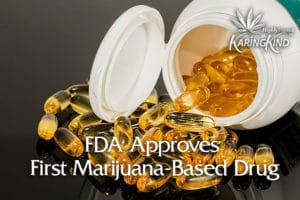(From the 2018 Archives)
On June 25, 2018, the FDA approved the first ever drug derived from marijuana.
The news caught many cannabis consumers off guard.
After all, isn’t marijuana federally illegal? How could a federal entity like the U.S. Food and Drug Administration approve a drug derived from a federally illegal substance?
For many consumers, this feels like hypocrisy… cannabis is illegal unless a pharmaceutical company is selling it.
For others, the FDA approval is nothing new. Their goal is to regulate dosage and rigorously test products to ensure consistent, uniform effects. And while this drug is derived from marijuana and includes CBD, the testing it has gone through is more rigorous and focused than many current cannabis products available in medical dispensaries.
Some people, however, see the FDA approval as an open door to deschedule cannabis. Schedule I drugs are classified as such because, among other qualifiers, they have “no currently accepted medical use.” (DEA.gov)
The government can hardly claim there is no accepted medical use when a cannabis-based drug was just approved by the FDA to treat certain rare forms of epilepsy.
Let’s take a look at how we got to this point and how the new drug could shake up the cannabis industry.
Why Pharmaceuticals? Why Now?
The question many cannabis consumers have is: why was this drug (Epidiolex) approved while marijuana remains illegal?
To answer the question, we’ll need to look at how the FDA approves new drugs.
One of the FDA’s primary concerns is around quality and testing. With many states making it easier for medical practitioners to prescribe marijuana for a variety of conditions, the FDA has expressed some concerns over inconsistent quality.
In their eyes, still-unproven claims about marijuana’s efficacy could prevent people from seeking approved medication. And the range of purity and potency available to consumers—something that is unlikely to change without FDA oversight—can mean users see different effects even when following doctor-recommended dosage.
So, a lack of “controlled testing” that meets stringent FDA standards could be one reason that marijuana hasn’t been approved to treat more conditions.
That gives a pretty large advantage to pharmaceutical companies that have built their businesses around the testing process. They know how to design and conduct clinical trials that give the scientific data the FDA needs to see before they can approve a drug.
Despite many current cannabis products using clean-grown flower, pure oil, and carefully testing for consistent potency and dosage, they don’t have the “right” data to secure FDA approval.
That doesn’t mean cannabis is blocked from testing, though. At least not in principle.
“The FDA is aware that there is considerable interest in the use of marijuana to attempt to treat a number of medical conditions, including, for example, glaucoma, AIDS wasting syndrome, neuropathic pain, cancer, multiple sclerosis, chemotherapy-induced nausea, and certain seizure disorders.”
The FDA goes on to say on their website:
“The FDA also has an important role to play in supporting scientific research into the medical uses of marijuana and its constituents in scientifically valid investigations as part of the agency’s drug review and approval process. As part of this role, the FDA supports those in the medical research community who intend to study marijuana.”
That all sounds great. But, because of marijuana’s Schedule I classification, many U.S. companies that grow and produce medical marijuana products have been barred—either directly or indirectly—from conducting the type of testing and research that would allow for FDA approval.
The hoops to jump through are too small and too many and too restrictive.
On top of that, “research-grade” cannabis in the U.S. has been widely panned by scientists and cannabis consumers as low quality that doesn’t come close to mirroring the quality of even bottom-shelf products available to medical patients and recreational consumers.
The pot grown for research purposes regularly tests at or below 13 percent THC… in Colorado the average recreational strain clocks in at about 19 percent THC, with some topping out closer to 30 percent.
As The Cannabist puts it, “It’s akin to investigating the effects of bourbon by giving people Bud Light.”
Federal marijuana also appears to contain contaminants like yeast and mold in levels that far exceed the standards adopted by states like Colorado and Washington.
According to the Denver Post’s own cannabis critic Jake Browne:
“That is, flat out, not a usable form of cannabis… In two decades of smoking weed, I’ve never seen anything that looks like that. People typically smoke the flower of the plant, but here you can clearly see stems and leaves in there as well, parts that should be discarded. Inhaling that would be like eating an apple, including the seeds inside it and the branch it grew on.”
And while the DEA announced it is accepting applications from new domestic producers that could increase the quality of research-grade cannabis, the Justice Department has yet to approve a single application.
Researchers outside of the U.S. have access to higher quality bud with which to conduct their tests, and they’re also able to study cannabis without the same barriers U.S. firms face.
As a result, the new drug from British firm GW Pharmaceuticals, Epidiolex, is the first to be manufactured using CBD from the cannabis plant. (Two synthetic cannabis medications have been approved by the FDA previously.)
Does Epidiolex Approval Require Rescheduling Cannabis?
The approval of Epidiolex marks the first time the FDA has admitted that cannabis has medical value.
Openly stating the medical benefits of cannabis flies in the face of the Controlled Substances Act, which holds that cannabis is an unsafe drug with no accepted medical use.
That doesn’t mean the approval of Epidiolex is a direct route to rescheduling cannabis, though.
In order for the new drug to go to market, the FDA will have to partner with the Justice Department to reschedule the cannabis-based pill.
They don’t need to reschedule cannabis—or even CBD… just Epidiolex.
But, given the popular approval of cannabis and the recent shift in stance from several Congresspersons, the finding that the CBD-based drug is safe with only a low potential for abuse could be the scientific evidence needed to finally reschedule cannabis—or at least CBD.
Another Step Toward Rescheduling Cannabis
Now that a cannabis-based drug has been approved by the FDA, how will the DEA and Justice Department react? Will they use the evidence of marijuana’s medical benefits as reason to reschedule the plant?
We’ll have to wait to find out. And waiting is always easier with a bit of clean-grown bud or naturally-extracted CO2 oil from Karing Kind, Boulder’s first recreational marijuana dispensary.
Karing Kind is located just off of US-36, one mile north of Broadway, open MON-SUN from 9am to 10pm.
While we carry a variety of strains, concentrates, edibles, salves and tinctures, inventory and stock levels fluctuate from week to week and month to month. Check our menu and follow us on Twitter for an up-to-date list of edibles, concentrates and buds available.

